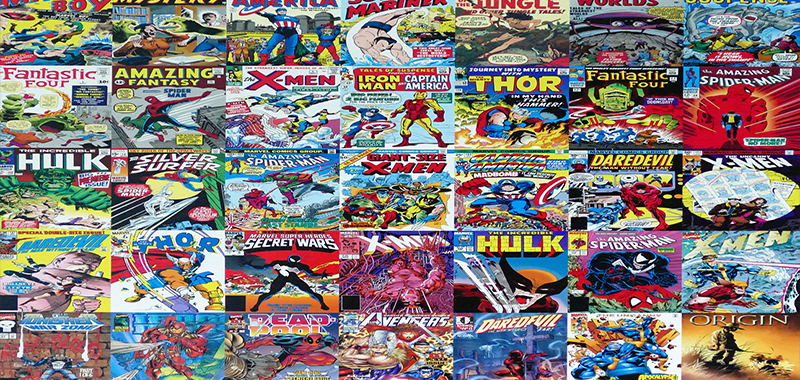
Could Marvel lose the copyright to its famous characters?
This article focuses on the copyrights of the characters, mainly superheroes, of one of the cinematic universes that can be considered one of the most consolidated nowadays, Marvel. In the Early Twentieth Century, Marvel’s beginnings were simple comic books and entertainment stories with a low budget, while today it has nearly 8,000 characters, an increasing popularity and an immense marketing and licensing structure that has allowed the creation of the MCU or Marvel Cinematic Universe.
Does it run the risk of losing the copyrights of its characters? Which would be the consequences?
Marvel, or rather The Walt Disney Company, the current owner of Marvel Studios, is facing several lawsuits from the heirs of the artistic creators of its most famous characters, who are requesting the return of the copyrights that they believe that belong to them. Along this article we will develop this issue.
Is it possible for Marvel to lose the copyrights of its most popular characters?
To understand this question, we must start from the fact that the vast majority of Marvel’s assets are protected by intellectual property rights: the copyrights of its stories and characters.
Moreover, Marvel signed a large number of concession licenses, mainly related to the cinematographic world, but also with respect to a wide variety of sectors, from toys to perfumes, accumulating high economic sums that have brought it to its current situation.
In 2005 the company started its own film production, and the licenses that brought it to the big screen and the notoriety it had and has nowadays, could also be said to be playing some hard tricks on it. On the one hand, its licensing strategy meant that the studios assumed the financial risk as Marvel continued to profit through multiple marketing avenues, including its comics. On the other hand, Marvel Studios has become a major film production company that remains unable to use, at least easily, some of the characters that they created, as many of the film licensing agreements that they signed in the past are still being withheld from them.
In addition, the U.S. Copyright Act of 1976 comes into play, which states that ownership of copyrights reverts to their original creators after a stipulated period of time, and for many Marvel characters this deadline is getting close.
What used to be a small business, now moves large economic figures and some cartoonists or their heirs have sued Marvel by filing notices of termination of copyright based on the abovementioned Act.
Why could Marvel lose the rights to Spider-Man and other MCU characters?
The case of the Spider-Man character is just one more of those in the same situation, since, at the end of 2021, several heirs of artists who created Marvel characters, as well as Stan Lee’s brother, requested the return of the copyrights or what is the same, the termination of the rights held by The Walt Disney Company, current owner of Marvel as we indicated above, based on the U.S. Copyright Act.
Some of these include the heirs of Steve Ditko, creator of the Spider Man character among others, who filed a notice of termination of the copyrights before the current owner of Marvel, Disney, based on the abovementioned, which could lead to Marvel losing the copyrights over this character in June 2023.
Similar to this case, is the one that involved the character Superman, in DC comics, where the heirs were victorious by forcing DC to include in all productions the line: “By special agreement with the Jerry Siegel family”.
However, we must take into account the case where the heirs of the cartoonist of several Marvel characters, Jack Kirby, brought this same action to recover the rights thereto. The federal court dismissed the heirs’ suit in favor of Marvel, declaring that Kirby’s work was a “works contract with cession of rights””, to which the heirs appealed to the U.S. Court of Appeals, which upheld the heirs’ claim. Even so, it was not settled in court, as Disney signed an extrajudicial agreement.
As a consequence, there is some uncertainty as what could have happened if such an agreement had not been reached, since the lawsuits against Marvel for the copyrights of its characters continue on and the decision of the Court that accepted the lawsuit to go ahead with the case, it’s important to keep in mind.
However, Marvel’s lawyer stated that the copyright termination claims are neither valid nor do they have any legal effect because the works were made under contract.
Disney is in a battle to preserve the copyrights of these characters
This battle in which Disney is involved over the copyright of Marvel’s characters has a determining figure, the works made under contract.
If the works made by the creators were ordered by the company, at the time Marvel, the legal author would be the employer and not the employee, where the above-mentioned section of the U.S. Copyright Act on which the petitioners base their claims would not apply.
Even so, if the heirs pursue their claims, Marvel would hardly lose the exploitation rights over the characters, but would be imposed to pay a monetary amount to the heirs.
In conclusion, it is important to determine the regime under which a work is created, in order to determine the rights it generates and with respect to which person or entity.
Letslaw is a law firm specialized in Intellectual Property, Industrial Property and New Technologies and we will be pleased to answer your questions.

Letslaw es una firma de abogados internacionales especializada en el derecho de los negocios.







